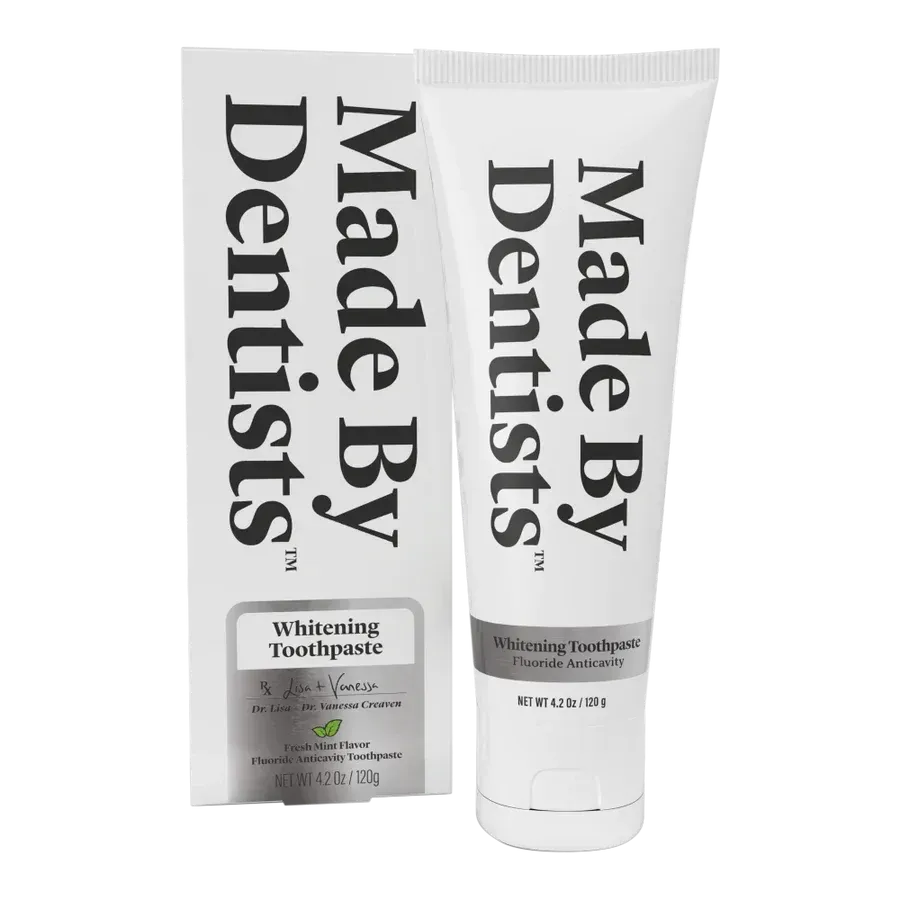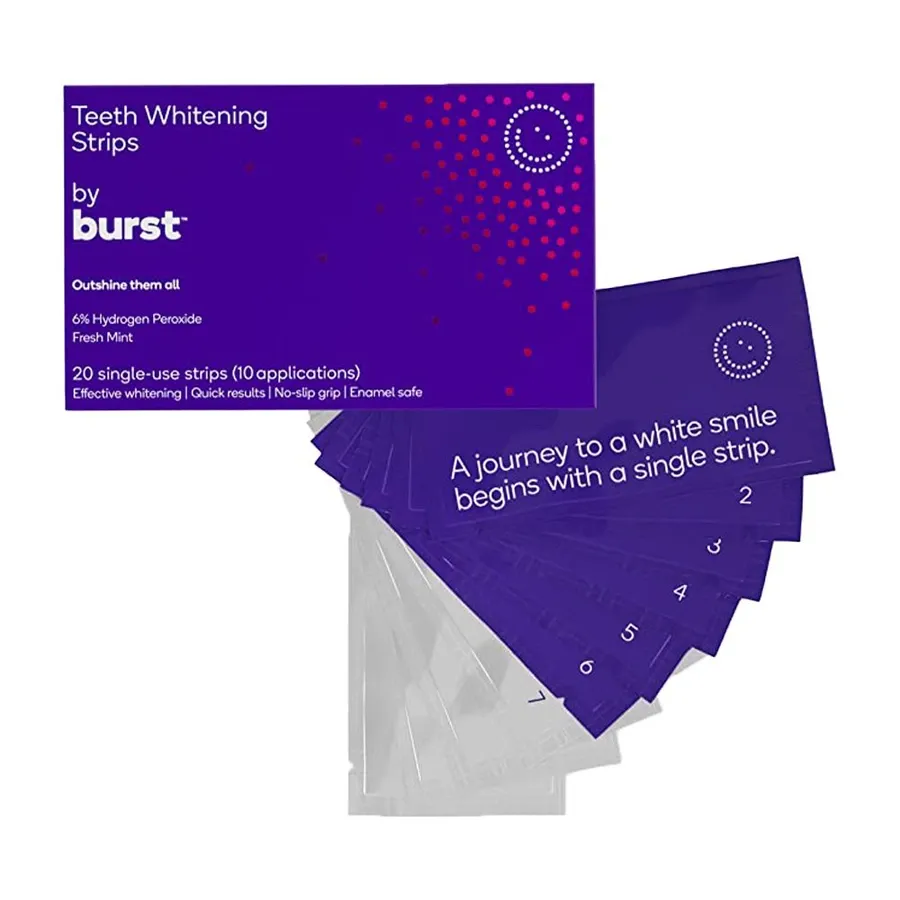5 Best Teeth Whitening Products for Sensitive Teeth

In this article, we may include products or services we think are useful for our readers. If you buy through links on this page, we may earn a small commission to help fund our mission to create more healthy smiles. Here’s our process.
Whether you’re using custom trays, toothpaste, or teeth whitening strips, sensitive teeth are a common side effect of using teeth whitening products. What’re the best teeth whitening for sensitive teeth, or is there one at all?! Depending on the techniques and products that you’re using, there are safe ways to complete teeth whitening for sensitive teeth, as long as you do so correctly.
Why Does Whitening Cause Teeth Sensitivity?
In cases of gum recession, exposed root surfaces have even more nerve tissues to stimulate.
Depending on the type of teeth whitening product, how it's applied, and the ingredient concentrations, sensitivity can vary. As long as you work with your dentist, teeth whitening for sensitive teeth is totally doable. But you need to have a game plan, use the right products, and always follow the directions. Don’t make it up as you go!
Talk To Your Dentist About Teeth Whitening With Sensitive Teeth
For example, they might recommend whitening options and products like the ones below.
5 Best Teeth Whitening Products For Sensitive Teeth
Not all teeth whitening products work the same. From the way they target stain particles to how strongly they whiten your teeth, you need to be careful about what you’re putting inside of your mouth. Below are the top options for whitening sensitive teeth:
1. Smile Brilliant Custom Sensitive Whitening Trays
Best Sensitive Teeth Whitening Trays & Gels
Smile Brilliant offers custom molded teeth whitening trays delivered to your door. Almost exactly like what you see in a dentist’s office. Smile Brilliant sends you a DIY impression kit in the mail to take your own molds of your teeth. They also include dentist-strength 22% carbamide peroxide in 3ml syringes with three tiers of teeth whitening strength:
- T3 Sensitive for light stains
- T6 Sensitive for average stains
- T9 Sensitive for heavy stains
You can also get custom trays made by your dentist. Then they’ll recommend which “level” of whitening gel to use in them. Simply place the gel in the trays, wear them once a day, and you’ll see gentle results in less time than commercial products. The dentist option tends to cost a bit more than online teeth whitening kits.
But for Smile Brilliant make sure you select the sensitive teeth option on their website, It is a bite confusing how to select the right teeth whitening system.
2. Crest 3D White Whitestrips Sensitive Teeth Whitening Kit
Best Teeth Whitening Strips
Only wear these strips for 30 minutes a day to easily spread out the whitening application process. One kit contains 14 applications. They’re highly rated and one of the most well-respected products on the market. The newer designs are less sticky and messy than the traditional whitening strips from years past.
3. Made by Dentist Whitening Toothpaste
Best Whitening Toothpaste
Whitening toothpaste is not really a teeth-whitening product. Whitening toothpaste work by reducing surface stains and limiting the reliance on teeth whiting products. Made by Dentists Whitening toothpaste is made with clinically-proven ingredients like hydrogen peroxide and formulated without:
- Gluten
- Sulfates
- BPA
- DEA
- Triclosan
- Paraben
- Alcohol
- Phthalates
- Artificial colors and artificial flavors
Made by Dentist Whitening Toothpaste is also vegan, PETA-certified, and cruelty-free. Adding a teeth-whitening toothpaste to your routine will help achieve a brighter smile without tooth sensitivity.
4. Burst Teeth Whitening Strips
Best Value Teeth Whitening for Sensitive Teeth
Like Crest 3D whitening kit but cheaper, these teeth whitening strips contain the same ingredients and application process for people on a budget. Burst Teeth Whitening strips are:
- Clinically Proven
- Safe for sensitive teeth
- Cruelty-free
- Only requires 15-minute treatments
The burst whitening strips also contain no parabens, phthalates, sulfates, major allergens, artificial sweeteners, flavors, or colors. This 15 minutes a day, 7-day treatment course is perfect for someone short on time and looking to save a bit of money!
5. Lumineux Oral Essentials Whitening Strips
Best teeth whitening kits without peroxide
Packed with natural ingredients, Lumineaux products also leave your breath feeling fresh after every application. Lumineaux strips are completely free of hydrogen peroxide if you’re looking for an alternative to traditional whitening systems. Their teeth whitening solution contains lemon peel oil, Dead Sea salt, coconut oil, and sage oil to help naturally lift surface stains for noticeably brighter teeth.
How Do You Whiten Teeth When You Have Sensitivity?
Safely and slowly. And never without the help of your dentist! Without realizing it, you could pick the wrong product and send shooting jolts of sensitivity through your teeth for days.
Only choose products formulated for sensitive teeth. Pair them with a sensitive toothpaste—rather than a whitening one—to balance the overall results.
Instead of choosing stronger products that whiten teeth in less time, it may be better to select gentler blends and space them out over a longer period of time.
Tips On How To Whiten Sensitive Teeth
Can you whiten your teeth with good, quality products while also “treating” the sensitivity at the same time? Yes! By getting ahead of your sensitive teeth, you can enjoy the best of both worlds. Here are just some of the things your dentist may suggest:
1. Before You Start to Whiten
Start using a sensitive toothpaste twice a day, at least one week before you start to whiten but preferably two weeks ahead. Sensitivity toothpaste can take up to two weeks for it to work to its full potential.
Next, choose your whitening product carefully. Preferably get one that’s specifically designed with sensitive teeth in mind. When in doubt, always ask your dentist.
Last but not least, make sure you’re caught up on your dental checkups. You want to have recently cleaned teeth, so that the whitening ingredients aren’t penetrating plaque and tartar instead of tooth surfaces. Plus, your hygienist can polish off any superficial extrinsic stain, giving you a head start on your whitening process. Most importantly, they’ll also screen for any active decay or disease that needs to be addressed before you whiten your teeth.
2. During the Application Process
This should go without saying, but make sure you’re only using your teeth whitening kit as directed. Wearing it too long, applying too much product, or trying to overdo it will seriously raise your risk of sensitive teeth.
Next, apply the whitening tray or strip correctly. Don’t rush the process. If the gel is getting on your gums, it’s going to irritate them and can cause chemical burns. Too much gel in a tray will cause it to overflow onto your gingiva (gums). As for strips, if they aren’t shaped around your teeth correctly, they can burn or bleach your gums too.
Set a timer and only wear your strips or trays for the prescribed time. If you’re sleeping in it or wearing it longer, it’s not going to make your teeth that much whiter but it will make your teeth hurt more.
Related: How to Use Burst White Strips
3. If It Hurts, Stop!
If your teeth whitener starts to hurt, then stop. Dental sensitivity can be very uncomfortable for people with gum disease and other dental problems. Teeth whitening agents like hydrogen peroxide and carbamide peroxide are not always formulated in the same way. Talk to your dentist about using a less concentrated formula and remember that your oral health is more important than having a brighter smile.
4. After You Whiten
Depending on the type of whitening system you’re using, it may say to rinse your mouth out with water afterward to remove any extra residue. Definitely make sure you’re not eating or drinking anything right after, otherwise, the stain from your food/drink will soak right back into your tooth enamel.
One of the most common tips that dentists give for people with sensitive teeth is to spread out the process. Maybe only wear your trays/strips once every other day, instead of daily.
To prolong your results, make sure you’re rinsing your mouth with water after meals, brushing and flossing properly, and scheduling regular dental cleanings. Also, do your best to avoid foods and drinks that would stain a white piece of fabric. If you’re going to drink a dark liquid (like tea) try to use a straw and then rinse your mouth with water immediately afterward.
How Do Teeth Get Stained?
First off, some of us have yellower teeth than others. This totally natural shade is because of the dentin layer of the tooth that’s under our white tooth enamel. Besides that, the tooth enamel is covered in thousands of tiny little tubules. That means every time you eat or drink something dark—like coffee, red wine, blueberries, or tomato sauce—the stain particles can pack into those tiny pores. The more frequently you expose your teeth to those things, the darker your smile will get. That’s why people who smoke or drink a lot of coffee tend to have darker smiles as the years go by.
Products To Reduce Stains
Although whitening toothpaste is known for triggering sensitivity, there are blends specifically made to prevent stain without unnecessary tooth sensitivity. For example, Sensodyne Extra Whitening Toothpaste and Colgate® Sensitive Whitening Toothpaste for Sensitive Teeth offer the best of both worlds. They help manage sensitive teeth while minimizing new stains from coffee, tea, soda, etc.
Related: 7 Best Toothpaste For Sensitive Teeth
Best Teeth Whitening for Sensitive Teeth
The best teeth whitening for sensitive teeth will be a system recommended by your dentist or hygienist and used as directed. To minimize irritation, start using a sensitive toothpaste and/or fluoride mouth rinse about a week prior to your whitening and every day through the duration of your whitening treatment, as well as 1-2 weeks afterward. Some dentists may recommend that you use your trays or teeth whitening strips every other day, instead of daily. Aside from in-office professional whitening treatments or teeth whitening strips, sensitive teeth are common for people using whitening toothpaste. It’s better to use something for sensitive teeth instead.





